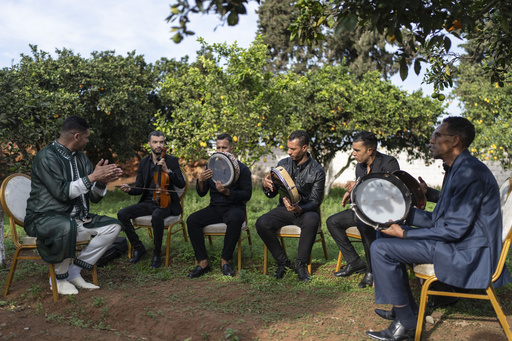
SIDI YAHYA ZAER, Morocco — When Mbarka Moullablad first expressed her desire to pursue a career as a cheikha, performing songs that capture themes of love, sorrow, and societal issues, her family was not pleased. She chose the stage name “Thouria” and aimed to honor the rich traditions of her ancestors through her music.
Moullablad is part of a revered oral tradition in Morocco known as aita, a genre of folk singing that translates to “cry” or “lament” in Arabic. Cheikha like her perform in various settings, ranging from lively bars and cabarets in bustling cities to intimate gatherings in rural areas. These artists enchant audiences at weddings, festivals, and local parties, moving hearts regardless of the crowd’s social standing.
Despite the cultural significance of aita, those who sing it often face societal stigma. Cheikha are frequently marginalized and eroticized, which once made Moullablad hesitant about her career choice. However, she has found acceptance within her community in Sidi Yahya Zaer, a rural town situated on Morocco’s Atlantic plains. “Initially, my family disapproved, and I faced societal judgment, but now I enjoy their support,” she shared during a recent performance near Rabat, the capital of Morocco. “I perform to provide for my children.”
Aita is not just music; it’s sung poetry that delves into a range of themes, including societal achievements, contradictions, and the struggles many face in everyday life, particularly concerning relationships and economic strife. Cheikha are known for their striking performances, donning heavy makeup, elegant silk caftans, and ornate takchita belts as they encapsulate their community’s pain and joy through song, moving their hips to heighten emotional impact.
During performances, audiences become captivated as Moullablad’s powerful voice soars through the range; her sister Fatiha dances gracefully, creating a vibrant atmosphere. The backing band, consisting of another vocalist, a drummer, a guitarist, and a violinist, creates a harmonious experience that amplifies the emotional depth of the songs.
Listeners often regard cheikha as the voices of their communities, addressing unspoken issues surrounding marriage, agriculture, and historical resistance to colonial rule. Singing in Moroccan Arabic, Moullablad draws on local traditions, while other cheikha incorporate the Amazigh language, ensuring their performances resonate with different regions across the North African kingdom.
This traditional art form has given rise to modern influences, including contemporary projects like “Aita, Mon Amour” and the Kabareh Cheikhats, a male ensemble that celebrates the legacy of Morocco’s prominent female folk singers from the 20th century. Additionally, the genre inspired Morocco’s latest submission for the Academy Awards, titled “Everybody Loves Touda,” centered on a single mother aspiring to showcase her singing talents in Casablanca’s vibrant entertainment scene.
In discussing the impactful nature of cheikha and aita, filmmaker Nabil Ayouch remarked on their unique ability to resonate with listeners from all walks of life, resulting in a trance-like experience reminiscent of gospel music during performances.
With Morocco experiencing a rise in popularity for Middle Eastern pop and rap from North African artists, the future of aita faces challenges amid rapid urban development and diminishing rural populations. Nonetheless, both artists and fans remain hopeful that the tradition will thrive. “Aita will not perish; it is rejuvenated by the youth,” asserted Rachid Kadari, a fellow Cheikh who performs aita. “Its essence is preserved while evolving with time, ensuring its appeal to both older and younger generations.”

